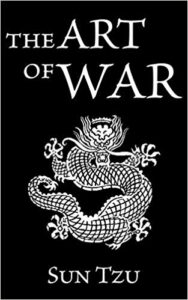
I recently read ‘Art of War’ attributed to Chinese military strategist ‘Sun Tzu’. The book is based on core war strategies covering all aspects including terrain, tools of war, manpower, strategy etc. An interesting read which made me realise similarities in war management & business management. This could not be more relevant than today when businesses face immense competition & P&L pressures.
Below is my interpretation of the book (just think of “officers” as your workforce & “generals” as your leadership) –
- He who relies solely on war like measures shall be exterminated, he who relies solely on peaceful measures shall perish
- Art of war is governed by 5 principles – moral law (rulers command), heaven (all times and seasons), earth (distances), commander (virtues of wisdom, benevolence, courage), method and discipline (army structures)
- Without constant practice the officers will be nervous and undecided when mustering for battle. Without constant practice the generals will be wavering and irresolute when crisis is at hand
- Though we discuss “stupid haste” in war, we’ve never heard of “clever delays”. That’s coz cost of operations is what must be calculated till the last cost. This is what wins you battles. Once the army has drained its resources, impoverishment comes to people of the state as inflation kicks in with heavy taxation. Thus a wise general always makes a point of foraging on the enemy (its resources)
- In order to kill the enemy, your soldiers must have a reward to look forward to. Always use spoils of war as reward so that soldiers are motivated – (HR Alert!)
- It is always good to capture enemy territory intact and not destroy it. Supreme excellence is breaking enemy resistance without fighting. The general who is unable to control his irritation will lead his men to a siege before time
- A kingdom must not be ruled from out, the army must not be directed from within – The consultants approach
- The skillful employer of men will employ the wise man, the brave man, the covetous man, and the stupid man. For the wise man delights in establishing his merit, the brave man likes to show his courage in action, the covetous man is quick at seizing advantages, and the stupid man has no fear of death
- If you know yourself and your enemy – You’ll always win. If you know yourself but not enemy – You’ll have equal wins and losses. If you know neither – You’ll always lose. This is true for any negotiation as well
- To lift an autumn hair is no sign of strength, to see sun and moon is no sign of sight and to hear a thunderstorm is no sign of good ear. Pointing out obvious things in business does not make for a leadership.
- Steps to victory are :
- Measurement
- Estimation
- Calculation
- Balancing of chances
- Victory
- Like only 5 primary tastes, there are only 2 strategies in war – direct and indirect. Their combination leads to infinite number of manoeuvres. Similarly, I believe businesses too have just 2 core strategies – Consolidation & Decentralisation!
- Simulated disorder postulates perfect discipline, simulated fear postulates perfect courage, simulated weakness postulates perfect strength
- Those who are waging war must get rid of all domestic troubles before getting to external enemy. A peaceful mind yields highest productivity. (Thought for “Stressed” work environment)
- On the field of battle, the spoken word does not travel far – thus drums and gongs, ordinary objects are not easily visible – thus banners and flags. We must train the organisation to follow single strategy linked to certain signs
- 5 faults which affect a General – recklessness (leads to destruction), cowardice (leads to capture), hasty temper (brings down your walls), delicacy of honour (sensitive to shame), over solicitude for his men (leads to worry and tension)
- If those who are sent to draw water begin by drinking themselves, it means the army is in thirst. You can get the idea of the whole army by one soldier. Thus, each person in the workforce must uphold the organisation’s flag at all times
- If the soldiers are not attached to you, they will not be submissive. Treat them with humanity at first instance but also enforce punishments with iron discipline
- The art of giving orders is not to rectify minor blunders and not to be swayed by petty doubts. Trust in your subordinates is the greatest asset a manager can have!
- 5 organisational calamities – flight (weak force against strong), insubordination (strong soldiers weak officers), collapse (strong officers weak soldiers), ruin (insubordinate officers and soldiers give a fight of their own without orders from a feeling of resentment), disorganisation (no fixed duties and haphazard org structure)
- The General must be quiet (secrecy), upright and just (order), able to mystify his men (keep them in total ignorance)
- Move not unless you see an advantage, use not your troops unless something is to be gained, fight not unless the position is critical – You must choose your battles carefully!
Some typical war strategies are also presented –
- Use of spies – local spies (local person), inward spies (official of enemy), converted spies (using enemy’s spies after catching them), doomed spies (doing things for deception so that enemy spies can report it), surviving spies (those who bring back news from enemy)
- Six types of terrains – accessible ground, entangling ground (easy to go in, difficult to come out), temporising ground (delay), marrow passes, precipitous heights, positions of great distance from enemy
Do share your views/feedback in the comments section